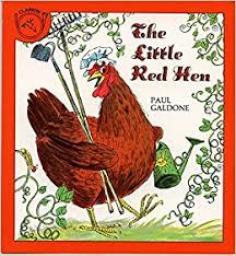The Little Red Hen
There were many animals on the farm. They lived there happily. Every day the farm family took care of them.
The little Red Hen was in the farmyard with her chickens when she found some grains of wheat. That is a small seed that can grow into a plant.
"Who will plant this wheat?" she said. “Please plant it. Then we can have more grain when the plant grows.”
"Not I," said the Goose.
"Not I," said the Duck.
"I will, then," said the little Red Hen. She was disappointed. The other animals should have helped. But she planted the grains of wheat by herself. She watered it, too. Every day she checked the plants to see how they grew. After a month, the wheat grew into plants.
The wheat plants had many more seeds. Those can be planted or used to make food. When the wheat was ripe she said, "Who will take this wheat to the mill?" The mill is a place where people grind the seeds. It turns into flour. Then you can make bread from the flour.
"Not I," said the Goose.
"Not I," said the Duck.
"I will, then," said the little Red Hen, sadly. “I will do it myself.” So then she took the wheat to the mill.
When she brought the flour home she said, "Who will make some bread with this flour?"
"Not I," said the Goose.
"Not I," said the Duck.
"I will, then," said the little Red Hen. She was disappointed again.
When the bread was baked, she said, "Who will eat this bread?"
"I will," said the Goose
"I will," said the Duck .
"No, you won't," said the little Red Hen. "You did not help. I will eat it myself. Cluck! Cluck!" She ate it with her children, the chickens.
